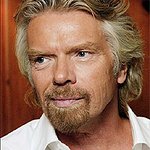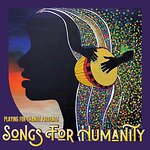Richard Branson has blogged about saving whales as he travels on his luxury catamaran, as part of his OceanElders initiative.
“Today I travel on Necker Belle, with my OceanElders hat on, out to the Atlantic breeding ground for Humpback whales,” he wrote on his official blog. "This will be a day to celebrate the success of the international community in coming together to save these beautiful species.
“It’s strange to think that only 100 years ago the largest employer of people in the United States was the whaling industry. They drove a number of species of whales into extinction. The North Atlantic grey whale for example and the beautiful Stella sea cow were also killed off for their oil. The Right whale was reduced to around 60 individuals. They were called the Right whale as they were easy to hunt because they were slow moving. They floated when they were killed and had lots of blubber that could be boiled into oil.
“The Right whale has slowly climbed back to 350 individuals in the world from only five different mothers. In a good year, there are about 20 new calves born. If the copepods they feed on have a low outbreak, then some years no new calves are born at all.
“Today the biggest threat to them is getting entangled in fishing gear or hit by boats going too fast in Cape Cod or the Bay of Fundy. The OceanElders and others will work with the fishing community and boat owners to try to address these issues by moving fishing lanes and reducing the speed of boats.
“The Humpback whale on the other hand has made a remarkable recovery. From all over the Atlantic, North, South, East and West, 15,000 whales travel to one sand bank off the north of the Dominican Republic to breed between February and March. Tomorrow we’ll be fortunate to go and swim with them and celebrate the success of the international community in protecting this particular species. It shows what can be done when the world works as one.
“There’s still work to be done to make sure that the Japanese Government does not use its financial muscle with small island communities to overturn the ban, plus work to be done to persuade them to stop taking 600 Minke whales and 50 Fin whales every year.”
Branson’s OceanElders was established last year to bring together global leaders to use their wide range of experience and influence, supported by science and data, to pursue the protection of the ocean’s habitat and wildlife. Founding members of the group include Ted Turner, Dr Sylvia Earle, Jackson Browne, Dr. Rita Colwell, Jean-Michel Cousteau, Graeme Kelleher, Sven Linblad, Captain Don Walsh and Neil Young.
In addition to working at the global policy level, OceanElders will develop a web-based network of regional Ocean Elders focused on garnering support for ocean-related issues in their local communities. The overarching goal is to make the oceans top-of-mind in people’s thoughts and conversations, bringing the issue to the forefront of the global agenda for the first time in history.
The idea for OceanElders was born on the Mission Blue Voyage to the Galapagos Islands in April 2010, where more than 100 scientists, business leaders, philanthropists and celebrities came together to help Dr. Sylvia Earle, 2009 TED Prize Winner. Given “one wish to change the world” by TED, Earle asked for help in catalyzing public support for the urgent need for ocean conservation by advocating for the establishment of a global network of marine protected areas − “hope spots” in Earle’s words − big enough to save and restore the ocean.
A Mission Blue Voyage participant and philanthropist, Gigi Brisson returned home inspired to sustain the momentum sparked in the Galapagos. Aware of the mission and positive impact of The Elders in addressing human rights, Brisson believed that a similar structure could be applied to benefit the ocean. Following its model, Brisson created and funded OceanElders, and targeted global leaders who had a personal passion for the ocean and all marine life.






